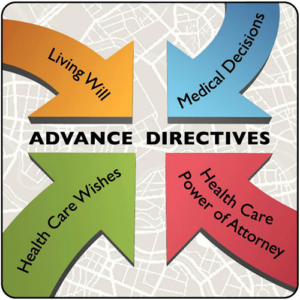
Do you want to leave these end-of-life decisions up to your loved ones or doctors—with no guidance from you? While we strive to be independent and maintain control of our lives, some of us may not have a say in our care during a debilitating illness. Advanced care planning makes your wishes known.
Guides to End-of-Life Planning
The first step includes clear and honest conversations with your family. Look for opportunities to help them understand how an advance directive in your medical record may spare them the anxiety of guessing your preferences during a medical crisis.
A survey by the Kaiser Family Foundation reported that 97% of people said it’s important to have end-of-life preferences in writing. However, only 34% have done it. The Conversation Project Starter Kit is a free guide to sharing your wishes for end-of-life care.
Two vital documents for your advance directive are a living will and a health care proxy form. Some states combine these documents into a single form.
What's the Purpose of a Living Will?
A living will is an advance care directive that spells out medical treatments you would or would not want if you couldn’t speak for yourself. You do not need a lawyer to complete a living will. Some critical medical decisions in a living will include whether or not you want specific life-prolonging medical treatments at certain stages of end-of-life care. For example:
- Do you want CPR if you’re unlikely to regain consciousness or are at the end stage of a terminal illness?
- At what point should doctors withhold a respirator or feeding tube to extend life?
- Would you want kidney dialysis if your kidneys fail?
Advance directive rules are different for almost every state. Search for advance directives and your state’s name to learn more about your state’s advance directive. Here are some other advanced care planning resources:
- Five Wishes is an advance directive form written in everyday language
- Living will and advance directive forms for every state.
- Advance directive information from CaringInfo.org
Be certain your preferences are known. Follow your state requirements for signatures and share your documents with a family member and your primary care doctor.
Identify a Health Care Proxy
A health care proxy, also called power of attorney for healthcare, medical power of attorney, or a healthcare agent, is a person you choose to make health care decisions if you cannot make them for yourself. Many states enable you to complete this specific document quickly. Search “healthcare proxy forms” and your state’s name.
Some advance directives may include spiritual requests, organ donation information, and choices for emergency treatments, such as Do Not Resuscitate orders.
How to implement your advance directive:
- Make copies of your advance directive and share two copies with proxies or agents named in your directive or power of attorney
- Make a print copy for your primary care doctor and send a digital version to the office or through your healthcare portal
- Talk about your wishes with family members and your doctor
- Keep a copy at home and let family or other loved ones know its location
Review your advanced directive periodically to make sure it reflects your current wishes and medical status. If you are unsure about what types of treatments, interventions, or life-prolonging measures you would want during a serious illness, advanced care planning can help you make decisions and express your preferences clearly. By communicating with family members and healthcare providers, you can ensure that your advanced directive accurately reflects your wishes and values.
Physician Orders for Scope of Treatment (POST) Form
A physician orders for scope of treatment (POST or POLST) is a set of instructions for health care professionals to recognize and honor a patient’s treatment preferences for life-sustaining measures, such as CPR, a breathing tube, and a feeding tube.
POST forms are typically for terminally ill or frail individuals who want to ensure their end-of-life wishes are followed by emergency personnel, doctors, and medical staff. The POST form is not a substitute for a more inclusive advance directive. Living wills and health proxy forms are more relevant for people in good health. What is a POST form, and do you need one? At Compassus, we recommend speaking with your doctor or advanced practice nurse to learn more about whether the POST form is right for you.
How Is a POST Form Different from a DNR?
A do not resuscitate (DNR) order is a one-page document focused only on a person’s preference not to receive cardiopulmonary resuscitation (CPR) if they stop breathing or their heart stops beating. The DNR does not address other medical treatments.
Learn More About Advanced Care Planning at Compassus
At Compassus, we understand the importance of advanced care planning and how to bring loved ones together to make decisions during times of crisis. Preparing for end-of-life care and advanced illness is critical to supporting you and your family in the best way possible.
To learn more about advanced care planning, visit Compassus online today. You can also call us at 833.380.9583 to get started.



